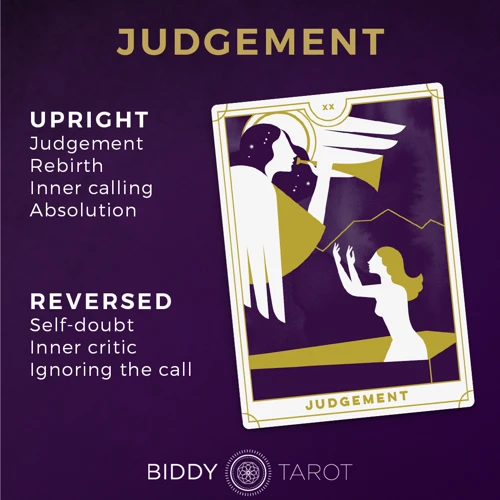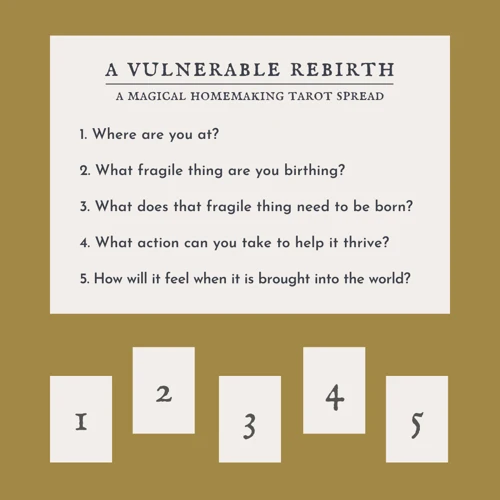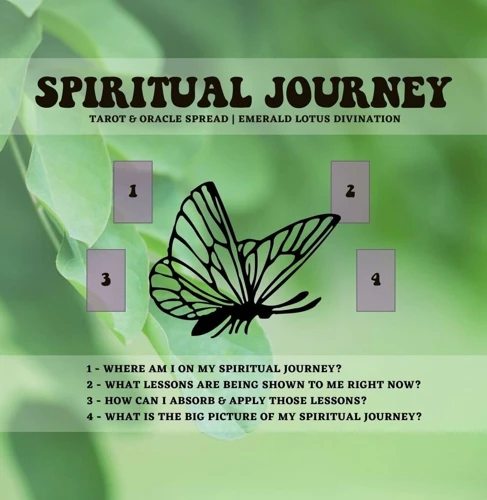The Judgment Card in tarot has a deeper meaning that goes beyond its name. It is a powerful symbol of self-evaluation, rebirth, and spiritual awakening. When this card appears in a tarot reading, it encourages us to reflect on our choices and actions, and to face the consequences of our decisions. Through self-reflection and learning from our mistakes, we can experience personal growth and transformation. The Judgment Card also represents the opportunity for rebirth, letting go of the past, and embracing new beginnings. It calls upon us to awaken spiritually, connect with our inner wisdom, and embrace higher consciousness. In this article, we will explore the symbolism of the Judgment Card, interpret its messages in tarot readings, and delve into the profound reflections and transformations it brings.
Contents
- Understanding the Judgment Card
- Reflecting on Self-Evaluation
- Experiencing Rebirth
- Awakening Spiritually
- Embracing Judgment’s Message
- Conclusion
-
Frequently Asked Questions
- 1. What does the Judgment Card symbolize in tarot?
- 2. How can the Judgment Card be interpreted in tarot readings?
- 3. What is the significance of the Archangel Gabriel blowing a trumpet on the Judgment Card?
- 4. Does the Judgment Card indicate any negative consequences?
- 5. How does the Judgment Card relate to the concept of rebirth?
- 6. Can the Judgment Card help in spiritual awakening?
- 7. Is forgiveness a theme associated with the Judgment Card?
- 8. How does the Judgment Card connect to personal responsibility?
- 9. Can the Judgment Card signify a fresh start in life?
- 10. How does the Judgment Card relate to inner wisdom?
- References
Understanding the Judgment Card

The Judgment Card is a significant card in the tarot deck that holds profound symbolism and meaning. It represents a moment of self-evaluation, rebirth, and spiritual awakening. To understand the Judgment Card, we must examine its symbolism and interpret its messages in tarot readings. This card often portrays the Archangel Gabriel blowing a trumpet, which is a symbol of awakening and calling upon individuals to reflect on their past actions and choices. The figures rising from coffins beneath Gabriel’s trumpet symbolize the rebirth and transformation that can occur through self-reflection and acceptance of the consequences of our actions. The Judgment Card signifies a turning point in one’s life, where they must face their past, let go of old patterns, and embrace new opportunities for growth and renewal. It is a card that prompts individuals to connect with their inner wisdom and spiritual consciousness, seeking personal redemption and forgiveness. The deeper understanding of the Judgment Card can be enhanced by exploring its connections to other tarot cards, such as The Hermit Card and The Emperor Card.
The Symbolism of the Judgment Card
The symbolism of the Judgment Card in tarot is rich and transformative. Every element in the card holds significant meaning and evokes reflection and awakening. Here are the key symbols found in the Judgment Card:
1. Archangel Gabriel: The presence of Archangel Gabriel blowing a trumpet represents divine intervention and awakening. Gabriel’s trumpet sound serves as a wake-up call, urging individuals to evaluate their lives and actions.
2. Resurrected Figures: The figures rising from coffins symbolize rebirth and transformation. They represent individuals who have passed through a period of introspection, confronted their past actions, and have been granted an opportunity for redemption and renewal.
3. Mountains and Ocean: The mountains in the background symbolize stability and the obstacles that individuals may face on their transformative journey. The ocean represents the vastness of emotions and the subconscious mind, signifying the depths one must delve into during self-evaluation.
4. White Banner: The white banner showcases purity, new beginnings, and a fresh start. It signifies the forgiveness and redemption available to those who have reflected on their past and are ready to move forward.
The symbolism of the Judgment Card invites individuals to face the consequences of their actions and embrace personal transformation. It resonates with the themes of self-reflection, forgiveness, and breaking free from negative patterns, aligning with the transformative energy found in the Devil Card.
Interpreting the Judgment Card in Tarot Readings
When interpreting the Judgment Card in tarot readings, it is crucial to consider the various elements and symbols present in the card. Here are some key aspects to focus on when interpreting the Judgment Card:
- Renewal and Awakening: The Judgment Card represents a time of personal renewal and awakening. It signifies a wake-up call, prompting individuals to reflect on their lives and assess their actions and choices. It suggests a need for introspection and self-evaluation to move forward.
- Assessment of Past Actions: The Judgment Card encourages individuals to take stock of their past actions and decisions. It highlights the importance of acknowledging both positive and negative aspects of one’s choices, accepting responsibility, and learning from mistakes.
- Reckoning and Consequences: This card emphasizes the concept of accountability and facing the consequences of one’s actions. It signifies that individuals must confront the outcomes, good or bad, of their past choices. It is an opportune time to make amends, seek forgiveness, and resolve any unresolved issues.
- Rebirth and Transformation: The Judgment Card suggests that through self-reflection and acceptance, individuals can experience profound personal transformation and a rebirth of spirit. It urges them to let go of old patterns, beliefs, and baggage, allowing room for growth, healing, and embracing new beginnings.
- Higher Calling: The card symbolizes a call to a higher purpose or a spiritual awakening. It indicates that individuals are being urged to align themselves with their true selves, their values, and their inner wisdom. It signifies an invitation to embark on a spiritual journey and connect with higher consciousness.
Interpreting the Judgment Card in tarot readings requires a careful analysis of these elements. It encourages individuals to embrace self-reflection, take responsibility for their actions, and seize the opportunity for personal growth and transformation. By delving into its symbolism and messages, tarot readers can provide valuable insights and guidance to those seeking a deeper understanding of their lives and the path they are on.
Reflecting on Self-Evaluation

Reflecting on self-evaluation is a significant aspect of embracing the message of the Judgment Card. It encourages individuals to take a deep and honest look at their choices and actions. Through self-evaluation, we can gain valuable insights into our behaviors and their impact on ourselves and others. One way to approach self-evaluation is by examining the decisions made and understanding the motivations behind them. By taking responsibility for our actions and acknowledging any mistakes or wrongdoing, we open the door to personal growth and transformation. Self-evaluation also involves recognizing and accepting the consequences of our choices, whether positive or negative. It is through this reflection that we can learn from our experiences and make conscious efforts to make better choices in the future. By embracing self-evaluation, individuals can cultivate a sense of self-awareness and become more mindful of their thoughts, words, and actions. This process of reflection allows for personal accountability, growth, and the opportunity for redemption and forgiveness.
Examining Our Choices and Actions
Examining our choices and actions is a crucial aspect of self-evaluation symbolized by the Judgment Card. When this card appears in a tarot reading, it serves as a reminder to pause and reflect on the decisions we have made thus far. It urges us to take a closer look at the consequences that have arisen from our actions and the impact they have had on ourselves and others. This examination allows us to gain valuable insights into our behaviors and thought patterns, enabling personal growth and transformation. It encourages us to honestly assess whether our choices align with our values and aspirations. Through introspection, we can identify any patterns or habits that may be holding us back, as well as recognize the opportunities for positive change. Examining our choices and actions allows us to take responsibility for the outcomes in our lives and empowers us to make more conscious and intentional decisions moving forward. By acknowledging both our successes and failures, we can learn from them and strive for personal growth and improvement. It is through this process of self-reflection that we can find the clarity and wisdom to make more aligned choices that lead to a more fulfilling and authentic life path.
Reaping the Consequences
When reflecting on the Judgment Card, a significant aspect to consider is the concept of reaping the consequences. This card serves as a reminder that our actions have repercussions, and it is essential to take responsibility for them. Reaping the consequences involves facing the outcomes of our choices, whether they are positive or negative. It prompts us to examine how our past decisions have shaped our present circumstances. By examining the consequences, we gain valuable insight into the patterns and behaviors that have led us to this point in our lives. This awareness allows us to make mindful choices moving forward. The Judgment Card encourages us not to shy away from the consequences but to embrace them as opportunities for growth and learning. It reminds us that only by acknowledging and accepting responsibility for our actions can we truly transform ourselves and move towards a more positive and fulfilling future. So, whether we find ourselves reaping the rewards of our good choices or confronting the challenges of our mistakes, the Judgment Card urges us to face these consequences head-on and embrace the lessons they offer.
Finding Redemption and Forgiveness
Finding redemption and forgiveness is a central theme associated with the Judgment Card. When this card appears in a tarot reading, it signifies the opportunity for individuals to reflect on their past actions and seek reconciliation with themselves and others. It serves as a reminder that no matter the mistakes or wrongdoings committed in the past, there is always a chance for personal growth and transformation. Redemption involves acknowledging one’s faults, taking responsibility for them, and making amends. It requires self-forgiveness, which can be a challenging process but is crucial for healing and moving forward. Forgiveness, on the other hand, involves letting go of resentment, anger, and grudges towards others or oneself. By forgiving others or themselves, individuals free themselves from emotional burdens and open up space for healing and personal development. The Judgment Card teaches us that finding redemption and forgiveness go hand in hand; it is through forgiveness that true redemption and liberation can be attained. This process of introspection, forgiveness, and redemption is a powerful journey that leads to self-acceptance, self-love, and a renewed sense of purpose.
Experiencing Rebirth

Experiencing rebirth is a central theme associated with the Judgment Card. It signifies a transformative phase in one’s life, where old patterns and beliefs are shed to make way for new beginnings. Embracing transformation is an essential aspect of this process, as it allows individuals to let go of the past and embrace the opportunities that lie ahead. It is a time for personal growth and a chance to break free from self-imposed limitations. By releasing attachments to old identities and embracing change, individuals open themselves up to new possibilities and experiences. Letting go of the past is a crucial step in this process, as it allows for healing and the cultivation of a fresh perspective. The Judgment Card encourages individuals to seize the moment, embrace their inner strength, and welcome the rebirth that awaits them.
Embracing Transformation
Embracing transformation is a key aspect of the Judgment Card’s message. When this card appears in a tarot reading, it signifies a profound opportunity for personal growth and change. To embrace transformation means to willingly and wholeheartedly embrace the process of change, even if it may be uncomfortable or challenging at times. It involves being open-minded, adaptable, and willing to let go of old patterns and beliefs that no longer serve us. Transformation requires us to step out of our comfort zones and explore new possibilities. It encourages us to take a leap of faith and trust in the process of change. By embracing transformation, we allow ourselves to evolve into the best versions of ourselves and create a life that aligns with our true desires and purpose. This can involve making significant life choices, embarking on new ventures, or even shifting our perspective and mindset. It is through the act of embracing transformation that we can fully embody the transformative energy of the Judgment Card and experience profound personal growth and empowerment.
Letting Go of the Past
Letting go of the past is a vital aspect of the Judgment Card’s message. When this card appears in a reading, it serves as a reminder that clinging to old wounds, regrets, or attachments can hinder our growth and prevent us from embracing new opportunities. It urges us to release the burdens of the past and move forward with a renewed sense of purpose and freedom. Letting go of the past requires acknowledging and accepting the lessons and experiences it has taught us, while also recognizing that dwelling on what cannot be changed only holds us back. By releasing the emotional baggage and negative patterns from our past, we open ourselves up to new beginnings and a chance to create a brighter future. It is important to remember that letting go does not mean forgetting or dismissing past experiences; instead, it means acknowledging them, finding closure, and choosing to no longer be defined by them. Through the act of letting go, we allow ourselves the space and clarity needed for personal growth and transformation. It is only by releasing the grip of the past that we can fully embrace the present and step into a future filled with infinite possibilities.
Embracing New Opportunities
Embracing new opportunities is a central theme embodied by the Judgment Card. When this card appears in a tarot reading, it is a powerful reminder that we have the ability to seize fresh beginnings and make meaningful changes in our lives. It encourages us to step out of our comfort zones and embrace the unknown with confidence and enthusiasm. Embracing new opportunities allows us to break free from the constraints of the past and open ourselves up to growth and transformation. It invites us to trust in the universe’s guiding hand and have faith in our own abilities to navigate uncharted territories. By embracing new opportunities, we can discover hidden talents, explore different paths, and expand our horizons. This powerful message of the Judgment Card reminds us that life is full of possibilities, and by stepping outside of our familiar routines, we allow ourselves to experience personal and spiritual growth. It is through these new opportunities that we can find fulfillment, purpose, and a deeper sense of joy and satisfaction in our lives.
Awakening Spiritually

The Judgment Card holds a profound message of awakening spiritually, urging individuals to connect with higher consciousness and delve into their inner wisdom. It is a powerful invitation to explore and embrace the spiritual aspects of life. When encountering the Judgment Card in a tarot reading, it signals a time of spiritual growth and transformation. This card encourages individuals to cultivate a deeper connection with their spiritual selves, transcending the mundane and materialistic aspects of existence. Through practices such as meditation, prayer, and reflection, one can tap into their inner guidance system and discover profound truths about themselves and the universe. The Judgment Card reminds us to open our hearts and minds to spiritual experiences, embarking on a journey of self-discovery and enlightenment. By embracing the message of the Judgment Card, individuals can embark on a path of spiritual awakening that leads to a greater sense of purpose, fulfillment, and connection to the divine.
Connecting with Higher Consciousness
Connecting with Higher Consciousness is a pivotal aspect of the Judgment Card’s message. It urges individuals to transcend their limited perceptions of reality and tap into a deeper spiritual awareness. There are several ways to foster this connection:
1. Meditation: Through regular meditation practices, individuals can quiet their minds, allowing them to access a state of inner peace and tranquility. This stillness opens the gateway to connect with higher realms of consciousness and gain insights beyond the confines of our everyday thoughts and experiences.
2. Prayer and Rituals: Engaging in prayer and performing sacred rituals can create a sense of sacredness and help individuals align themselves with higher powers and universal energies. These practices cultivate a connection with the divine and foster a deeper understanding of one’s place in the universe.
3. Exploring Spirituality: Delving into various spiritual traditions, philosophies, and teachings can expand one’s understanding of higher consciousness. By studying different belief systems, individuals can gain a broader perspective on the nature of reality and explore their own spiritual path.
4. Connecting with Nature: Spending time in nature allows individuals to connect with the awe-inspiring beauty and wisdom of the natural world. Whether it is through walks in the forest, sitting by the ocean, or simply observing the intricate patterns of a flower, nature can serve as a gateway to experiencing a profound sense of interconnectedness and unity with all of creation.
By actively seeking to connect with higher consciousness, individuals can awaken their spiritual nature and tap into a greater understanding of themselves and the world around them. This connection serves as a guiding light on their journey of personal growth and transformation.
Discovering Inner Wisdom
Discovering Inner Wisdom is a profound aspect of the spiritual journey represented by the Judgment Card. It is a process that involves tapping into our intuition, delving deep into our subconscious, and connecting with the wisdom that resides within us. Through introspection and reflection, we can uncover valuable insights and guidance that can help us navigate through life’s challenges. When we are open to discovering our inner wisdom, we become more attuned to our true desires, passions, and purpose, enabling us to make decisions that align with our authentic selves. This inner wisdom acts as a guiding force, providing us with clarity and direction. It allows us to access a deeper understanding of ourselves and the world around us. To cultivate inner wisdom, practices such as meditation, journaling, and quiet contemplation can be beneficial. These activities create space for self-reflection and invite the whispers of intuition to emerge. By actively seeking and embracing our inner wisdom, we gain valuable insights that can lead us towards personal growth, transformation, and a more fulfilling life journey.
Embracing Spiritual Growth
Embracing spiritual growth is a core aspect of the message conveyed by the Judgment Card. It urges individuals to delve deeper into their spiritual journey and connect with higher consciousness. Here are some ways to embrace spiritual growth:
- Self-Reflection: Take the time to reflect on your beliefs, values, and actions. Engage in introspection to gain a deeper understanding of yourself and your place in the universe.
- Meditation: Incorporate meditation into your daily routine to cultivate stillness and inner peace. Through meditation, you can quiet the mind and create space for spiritual insights and growth.
- Seeking Knowledge: Explore various spiritual teachings, philosophies, and practices. Read books, attend workshops, or join spiritual communities to expand your knowledge and gain new perspectives.
- Connecting with Nature: Spend time in nature and appreciate its beauty. Connect with the natural elements around you and observe the interconnectedness of all living beings. Nature has a profound way of nurturing our spirits and fostering spiritual growth.
- Gratitude Practice: Cultivate an attitude of gratitude and appreciation for the blessings in your life. Acknowledge and express gratitude for the spiritual experiences and growth you have encountered along your journey.
- Service to Others: Engage in acts of kindness and service to others. By helping and supporting others, you align yourself with a higher purpose and tap into the transformative power of compassion and selflessness.
Remember, embracing spiritual growth is a personal and unique journey. Each individual’s path will be different, and it is essential to follow what resonates with your heart and soul. The Judgment Card reminds us that as we embrace spiritual growth, we awaken to our true selves and experience a profound sense of fulfillment and enlightenment.
Embracing Judgment’s Message
Embracing the message of the Judgment Card is a transformative and empowering journey. It calls upon individuals to accept personal responsibility for their actions and decisions. By acknowledging the consequences of our choices, we can initiate a process of self-reflection and growth. Embracing the message of the Judgment Card means being open to introspection, examining our past behaviors and patterns, and recognizing areas where we need improvement. It encourages us to let go of feelings of guilt or shame and instead focus on seeking redemption and forgiveness. Through this process, we can actively seek personal growth and strive for positive transformation. The Judgment Card reminds us that change is possible and that we have the power to shape our own destiny. By embracing self-reflection, taking responsibility, and seeking personal growth, we can fully integrate the profound messages of the Judgment Card into our lives.
Accepting Personal Responsibility
Accepting personal responsibility is a vital aspect of the Judgment Card’s message. It urges individuals to acknowledge and take ownership of their actions, choices, and their impact on themselves and others. This card reminds us that we have the power to shape our lives through the decisions we make. It calls upon us to reflect on the consequences of our actions without shifting blame onto external factors. Personal responsibility involves recognizing our mistakes, learning from them, and making amends when necessary. By accepting personal responsibility, we empower ourselves to make positive changes in our lives and navigate towards a path of growth and transformation. It encourages us to let go of any victim mentality and instead focus on what we can do to improve ourselves and our circumstances. Accepting personal responsibility is an essential step towards personal development and a key theme within the broader concept of the Judgment Card’s message.
Embracing Self-Reflection
Self-reflection is a powerful tool for personal growth and transformation, and the Judgment Card invites us to embrace this process fully. Self-reflection allows us to examine our thoughts, emotions, and behaviors objectively, gaining a deeper understanding of ourselves and our actions. It provides an opportunity to assess our strengths and weaknesses, recognizing areas where we may need improvement or change. Embracing self-reflection involves setting aside dedicated time for introspection, whether through journaling, meditation, or simply quiet contemplation. It requires us to be honest with ourselves, acknowledging both our successes and our mistakes. Through self-reflection, we can gain clarity about our values, beliefs, and desires, enabling us to align our actions with our true authentic selves. This practice helps us make more conscious choices and navigate through life with greater wisdom and self-awareness. Embracing self-reflection broadens our perspective and empowers us to evolve and grow as individuals.
Seeking Personal Growth and Transformation
Seeking personal growth and transformation is a central theme of the Judgment Card. When this card appears in a tarot reading, it serves as a powerful reminder that we have the opportunity to evolve and become the best version of ourselves. To embark on this journey of personal growth, we must embrace self-reflection and be open to change.
Here are some key aspects to consider when seeking personal growth and transformation:
1. Exploring Inner Strength: The Judgment Card encourages us to tap into our inner strength and recognize the potential within us. It urges us to take a deeper look at our abilities, talents, and aspirations, and to believe in our capacity for growth.
2. Embracing Vulnerability: Personal growth often involves stepping outside our comfort zones and facing our fears. It requires vulnerability and the willingness to confront and overcome obstacles that hold us back. Embracing vulnerability allows us to grow stronger and more resilient.
3. Setting Intentions: Transformative growth requires setting clear intentions and goals. It involves envisioning the kind of person we want to become and the life we want to lead. By setting intentions, we create a roadmap for our personal growth journey.
4. Working on Self-Improvement: The Judgment Card reminds us that personal growth is an ongoing process. It encourages us to identify areas of our lives that need improvement and take intentional steps towards self-improvement. This could involve developing new skills, adopting healthier habits, or cultivating positive relationships.
5. Cultivating Self-Compassion: Personal growth and transformation are more effective when accompanied by self-compassion. It is essential to treat ourselves with kindness, understanding, and forgiveness as we navigate through challenges and setbacks. Self-compassion allows us to learn from our mistakes and grow without self-judgment.
6. Embracing Lifelong Learning: The journey of personal growth is an opportunity for continuous learning and exploration. It involves seeking knowledge, seeking new perspectives, and being open to new experiences. Embracing lifelong learning enables us to expand our horizons and deepen our understanding of ourselves and the world around us.
The Judgment Card’s message of seeking personal growth and transformation encourages us to take an active role in our own development. By embracing self-reflection, setting intentions, working on self-improvement, and cultivating self-compassion, we can embark on a transformative journey towards becoming the best version of ourselves.
Conclusion
In conclusion, the Judgment Card holds a profound message for self-reflection and spiritual growth. It reminds us of the importance of personal responsibility and embracing the consequences of our choices and actions. Through self-evaluation and accepting accountability, we have the opportunity to learn from our mistakes and experience personal transformation. The Judgment Card also encourages us to seek forgiveness and redemption, both from ourselves and from others. It reminds us to let go of the past and embrace new beginnings, allowing ourselves to be reborn and experience a sense of liberation. By connecting with our inner wisdom and embracing spiritual growth, we can navigate life with greater clarity and purpose. The Judgment Card serves as a powerful reminder to continuously seek personal growth, never losing sight of the transformative power within ourselves.
Frequently Asked Questions
1. What does the Judgment Card symbolize in tarot?
The Judgment Card in tarot symbolizes self-evaluation, rebirth, and spiritual awakening. It represents a time of reflection, facing consequences, and embracing personal growth.
2. How can the Judgment Card be interpreted in tarot readings?
In tarot readings, the Judgment Card often suggests a need for self-reflection, making amends for past actions, and seizing new opportunities for transformation and renewal.
3. What is the significance of the Archangel Gabriel blowing a trumpet on the Judgment Card?
The trumpet blown by Archangel Gabriel on the Judgment Card signifies an awakening and a call to individuals to reflect on their past choices and actions. It represents a turning point and a chance for rebirth.
4. Does the Judgment Card indicate any negative consequences?
While the Judgment Card can signify facing consequences, it is not inherently negative. It emphasizes personal growth, learning from mistakes, and moving forward with wisdom and understanding.
5. How does the Judgment Card relate to the concept of rebirth?
The Judgment Card represents the opportunity for rebirth by letting go of the past and embracing new beginnings. It encourages individuals to shed old patterns and embrace transformation and personal growth.
6. Can the Judgment Card help in spiritual awakening?
Yes, the Judgment Card can serve as a catalyst for spiritual awakening. It prompts individuals to connect with their inner wisdom, seek higher consciousness, and embark on a journey of spiritual growth.
7. Is forgiveness a theme associated with the Judgment Card?
Yes, forgiveness is often associated with the Judgment Card. It encourages individuals to seek redemption, both from others and themselves, and to release any lingering guilt or resentment.
8. How does the Judgment Card connect to personal responsibility?
The Judgment Card emphasizes personal responsibility by urging individuals to reflect on their choices and actions. It reminds them that their decisions shape their lives and encourages them to take ownership of their actions.
9. Can the Judgment Card signify a fresh start in life?
Absolutely. The Judgment Card represents the opportunity for a fresh start. It encourages individuals to let go of past regrets, embrace new opportunities, and embark on a journey of personal transformation.
10. How does the Judgment Card relate to inner wisdom?
The Judgment Card prompts individuals to tap into their inner wisdom and intuition. It encourages them to trust their instincts, listen to their inner voice, and make decisions guided by their deeper understanding.






